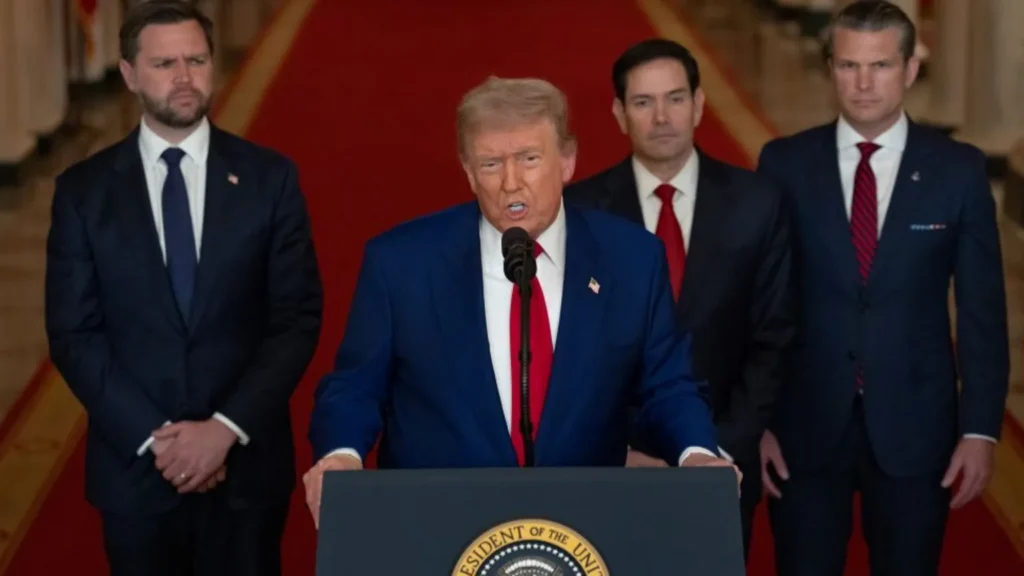
Trump Boasts NATO Praise Ahead of Summit
Aboard Air Force One en route to the NATO summit in the Netherlands, President Trump shared a strikingly complimentary message from an unexpected source: NATO Secretary-General Mark Rutte.
In a text message Trump posted on his Truth Social account, Rutte praised the president’s bold military action against Iran.
“Congratulations and thank you for your decisive action in Iran,” Rutte wrote. “That was truly extraordinary and something no one else dared to do.”
The message stood out not just for its praise but also for the source. Trump has had a tense history with NATO, having previously questioned the alliance’s collective defense commitments and criticized other members for insufficient military spending.
Rutte acknowledged those past tensions while expressing optimism about Trump’s reception at the summit. “You’re flying into another big success,” he wrote, noting that NATO members had agreed to Trump’s call for a significant increase in defense spending—raising their targets to 5% of GDP. “It will be your win,” the message concluded.
The president’s decision to publicly share the exchange underscored just how much the diplomatic landscape—in both the Middle East and among Western allies—has shifted in Trump’s favor.
Just days earlier, Trump had left the G7 summit in Canada early, as tensions between Israel and Iran escalated and U.S. military involvement appeared imminent.
By Saturday night, U.S. bombers had struck Iran’s nuclear facilities. By Tuesday morning, Trump was back on the world stage, this time with a fragile ceasefire in place between the two adversaries.
The NATO press office confirmed to the BBC that Rutte’s text message was authentic. It aligns with White House officials’ narratives—both public and private—that Trump’s military strike neutralized Iran’s nuclear threat, triggered a ceasefire, and ended what the president now calls the “12 Day War.”
Trump’s Ceasefire Moment: Victory, Doubts, and a Fragile Calm
President Trump’s personal involvement in securing a ceasefire—marked by a sharp rebuke of both Iran and Israel on Tuesday morning, and what the White House described as an “exceptionally firm and direct” phone call to Israeli Prime Minister Benjamin Netanyahu from Air Force One—was pivotal in bringing the fighting to a halt.
Just a week ago, U.S. allies were bracing for escalation. Now, Trump heads to Europe seemingly expecting praise for brokering peace—at least temporarily.
But the situation remains more complex than a clear-cut triumph.
The White House has touted the U.S. airstrikes on Iran as a decisive success, claiming they “obliterated” the country’s nuclear research infrastructure. Yet, according to preliminary Pentagon intelligence shared with U.S. media, the damage may have been significantly overstated.
Military officials suggest that Iran’s nuclear program has likely only been delayed by a matter of months. The country’s stockpile of enriched uranium—a crucial ingredient for nuclear weapons—remains largely intact, sources told CBS News. There are also reports of a previously undisclosed, untouched research facility elsewhere in Iran.
The White House has pushed back strongly, calling the Pentagon’s findings “flat-out wrong” and accusing critics of trying to undermine President Trump.
While the ceasefire is holding for now, its durability is uncertain. The Iranian regime has been significantly weakened by two weeks of relentless Israeli strikes, leaving the country politically unstable.
History offers sobering context: the Syrian civil war stands as a cautionary tale of what can happen when authoritarian regimes begin to unravel. Despite Trump’s rhetoric about bringing “love, peace, and prosperity” to Iran, the region remains on edge—and instability looms as a real possibility.
Even though Trump has succeeded, for now, in halting the latest round of Israel-Iran violence, the other conflicts he vowed to end—namely those in Gaza and Ukraine—continue without resolution.
For the Trump White House, however, those battles seem to be concerns for another day.
At home, early warnings from some of Trump’s Republican critics have so far failed to materialize. Congressman Thomas Massie of Kentucky, who had planned to introduce legislation limiting Trump’s military authority in Iran, has shelved that effort—for now—giving the president more room to declare victory.
That breathing space has allowed Trump and his administration to frame recent events as a foreign policy win.
Vice President J.D. Vance, a key ideological voice in the administration, echoed that sentiment on Truth Social Tuesday morning, outlining what he called Trump’s three-pronged “foreign policy doctrine”:
“1) Clearly define an American interest;
2) Negotiate aggressively to achieve that interest;
3) Use overwhelming force if necessary.”
But critics argue that this doctrine lacks depth. Trump’s foreign policy often appears reactive and inconsistent—more tactical than strategic. From flipping tariffs on and off to changing tones with both allies and enemies, consistency has rarely been a hallmark.
In just two weeks, Trump has shifted from distancing the U.S. from Israeli attacks on Iran to joining them; from demanding Iran’s “unconditional surrender” to brokering a ceasefire with vague terms; from flirting with regime change to walking it back.
The result is a foreign policy that feels like a high-speed rollercoaster, constantly threatening to go off the rails.
Still, as Trump and his allies are quick to point out: results matter. And for now, the ride has ended in a victory lap.


